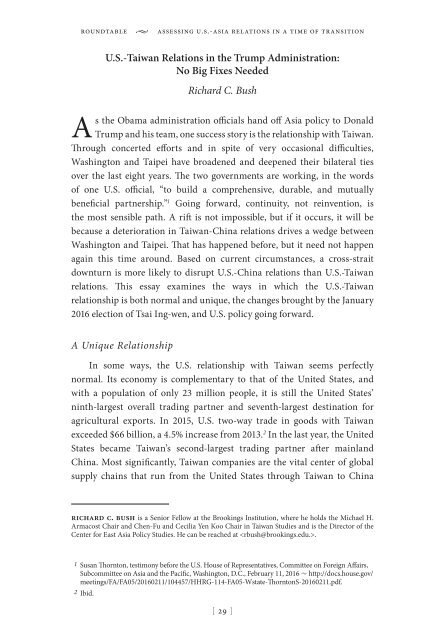2jBVKVf
2jBVKVf
2jBVKVf
Create successful ePaper yourself
Turn your PDF publications into a flip-book with our unique Google optimized e-Paper software.
oundtable • assessing u.s.-asia relations in a time of transition<br />
U.S.-Taiwan Relations in the Trump Administration:<br />
No Big Fixes Needed<br />
Richard C. Bush<br />
As the Obama administration officials hand off Asia policy to Donald<br />
Trump and his team, one success story is the relationship with Taiwan.<br />
Through concerted efforts and in spite of very occasional difficulties,<br />
Washington and Taipei have broadened and deepened their bilateral ties<br />
over the last eight years. The two governments are working, in the words<br />
of one U.S. official, “to build a comprehensive, durable, and mutually<br />
beneficial partnership.” 1 Going forward, continuity, not reinvention, is<br />
the most sensible path. A rift is not impossible, but if it occurs, it will be<br />
because a deterioration in Taiwan-China relations drives a wedge between<br />
Washington and Taipei. That has happened before, but it need not happen<br />
again this time around. Based on current circumstances, a cross-strait<br />
downturn is more likely to disrupt U.S.-China relations than U.S.-Taiwan<br />
relations. This essay examines the ways in which the U.S.-Taiwan<br />
relationship is both normal and unique, the changes brought by the January<br />
2016 election of Tsai Ing-wen, and U.S. policy going forward.<br />
A Unique Relationship<br />
In some ways, the U.S. relationship with Taiwan seems perfectly<br />
normal. Its economy is complementary to that of the United States, and<br />
with a population of only 23 million people, it is still the United States’<br />
ninth-largest overall trading partner and seventh-largest destination for<br />
agricultural exports. In 2015, U.S. two-way trade in goods with Taiwan<br />
exceeded $66 billion, a 4.5% increase from 2013. 2 In the last year, the United<br />
States became Taiwan’s second-largest trading partner after mainland<br />
China. Most significantly, Taiwan companies are the vital center of global<br />
supply chains that run from the United States through Taiwan to China<br />
richard c. bush is a Senior Fellow at the Brookings Institution, where he holds the Michael H.<br />
Armacost Chair and Chen-Fu and Cecilia Yen Koo Chair in Taiwan Studies and is the Director of the<br />
Center for East Asia Policy Studies. He can be reached at .<br />
1 Susan Thornton, testimony before the U.S. House of Representatives, Committee on Foreign Affairs,<br />
Subcommittee on Asia and the Pacific, Washington, D.C., February 11, 2016 u http://docs.house.gov/<br />
meetings/FA/FA05/20160211/104457/HHRG-114-FA05-Wstate-ThorntonS-20160211.pdf.<br />
2 Ibid.<br />
[ 29 ]


